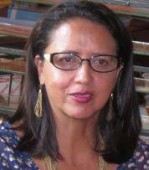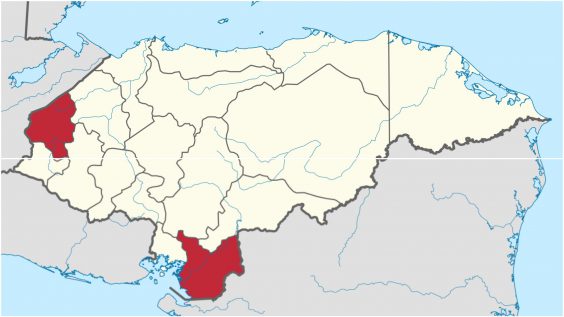The Role of the State of Honduras in Protecting the Human Rights of its Inhabitants Against the Greed of Businesses
by Dina Meza translated by Katherine Wingfield-Dobbs / October 10, 2016 / No comments
In two communities, Hondurans are physically suffering as a result of environmental contamination caused by mining and energy companies.
Honduras has become a park for sale to the highest bidder for its lands. The arrival of the current president, Juan Orlando Hernández, and his actions in Parliament prior to taking the presidential seat, give a clear indication that the country is a commodity and not a nation in need of development for its population.

- Honduras has one of the world’s highest murder rates. It is also one of the most dangerous countries to practice journalism, ranking 129th out of 180 in the 2014 World Press Freedom Index. Journalists are regularly threatened, attacked, and killed for their work. The Honduran government fails to punish those who use violence against reporters, essentially granting them impunity. This space will be dedicated to examining the lack of protection for Honduran journalists exercising their profession. Topics will include the use of state-sponsored advertising as a mechanism to reward or punish publications, and censorship and self-censorship as hindrances to democratic progress.

- Born in Cofradía, Honduras, Dina Meza has been recognized by PEN International, Amnesty International, Index on Censorship and Reporters without Borders for her work as a journalist and human rights advocate. Currently, Dina is the driving force behind the creation of Honduras PEN Centre. In 2013, she wrote “Reign of Terror,” an in-depth report on threats to Honduran journalists for Index on Censorship’s magazine. In 2014, she was named one of Reporters Without Borders’ “100 Heroes and Heroines of Information.”
On this occasion, I will make reference to only two cases: that of the community of Azacualpa in the Copán department, western Honduras and that of the Victor Argeñal community in the Choluteca department, southern Honduras. The bodies of their inhabitants are suffering terribly as a result of environmental contamination caused by companies, without the Honduran State doing anything about it, despite complaints lodged by the residents.
In Azacualpa, the entity responsible is the mining company Minerales de Occidente (MINOSA), a subsidiary of the Canadian company Aura Minerals. In the Victor Argeñal community, they are faced with the might of Grupo Terra and the Spanish company SunEdison.
I have been in contact with both communities. I went to Azacualpa, where no one in the government told me of the damage caused by Aura Minerals mining. I heard testimonies from residents who recounted the hell within their bodies as a result of contamination by heavy metals brought about by opencast mining on their lands.
This community suffered constant harassment from all the State institutions that supported Aura Minerals in their deadly project, putting pressure in such a way that they forced the people of Azacualpa to sign an agreement that would allow the mining company to remove corpses from the cemetery in order to reach the gold beneath the graves. In exchange, they committed to turning Azacualpa into another ghost town as people were forced to leave their own land.
In an act of commitment, it will go down in history that the Honduran State got involved in the area to exert more pressure. If there is justice one day in Honduras, those people will be prosecuted for committing an environmental crime and for allowing human rights violations.
Prior to signing, the people in this area suffered so much repression that they were accused by the mining company, the State Prosecutor, and the police who acted with “much diligence” in failing to do their job and respect the allegations submitted by the residents, which are still gathering dust.
With regard to the Victor Ageñal community, around two thousand families brought allegations before the State Prosecutor about the environmental damage and health issues caused by those businesses with the support of the Empresa Nacional de Energía Electrica (ENEE – National Electrical Energy Company). But their allegations were allowed to gather dust. In exchange, the State Prosecutor, through the District Attorney’s Office of the Consumer and Senior Citizens, took the names of the complainants in order to begin a judicial process which they now find themselves facing.
The majority of the complainants are women over sixty. What is serious in this case is that the State Prosecutor did nothing with the complaint they filed and treacherously issued an indictment, using the documents submitted with identification numbers and descriptions of the damage caused to their homes of more than three million Lempiras (approximately $130,577). This is a pittance compared to the massive profits of the responsible companies. The only crime of the residents was to protest against the abuses committed by these companies.
It fell to me to attend the initial hearing against the 42 residents on September 14, 2016. There was the Prosecutor, Jhony Bladimir Dubón Burgos, who heard the complaint. Before the hearing, he was blatant when he told three of the residents: “look, do not believe that I have not considered the complaint, but this is how we advance…” Minutes later he ratified the indictment as an Offense against Public Services and against the people of the State of Honduras.
I could see the faces of the accused men and women: the disillusionment with a justice system that attacks the poor and protects the powerful. I saw a judge who colluded with the injustice and who ratified the formal indictment in order that it follow the criminal process through to the public trial. He did not accept a plea from the defense attorney who had been delegated to represent the residents by the organization ACI-Participa (Asociación para una Ciudadanía Participativa, or the Association for Participatory Citizenship). The attorney told the judge that in the hearing, they were committing an arbitrary act since it should have been the Attorney General of the Republic, but the judge told him he was rejecting the plea.
An old woman with tears in her eyes told me that she lives above an inferno. Her house is a few steps from where they installed photovoltaic energy. She told me that her house shakes as a result of the operations of the companies Terra and SunEdison and the heat is hellish. “It is so frightening to live there but I have nowhere else to go. The birds die from the heat and we are suffocating. My blood pressure has gone up and I have been in hospital where the doctor who saw me said that I should leave there if I don’t want to die,” stated the old woman.
The State of Honduras does not protect the human rights of its inhabitants and colludes with the companies who violate them. The population is totally unprotected. All that is left for the citizens is to exercise their right to live in peace and development and to exercise their right to protect the environment.





